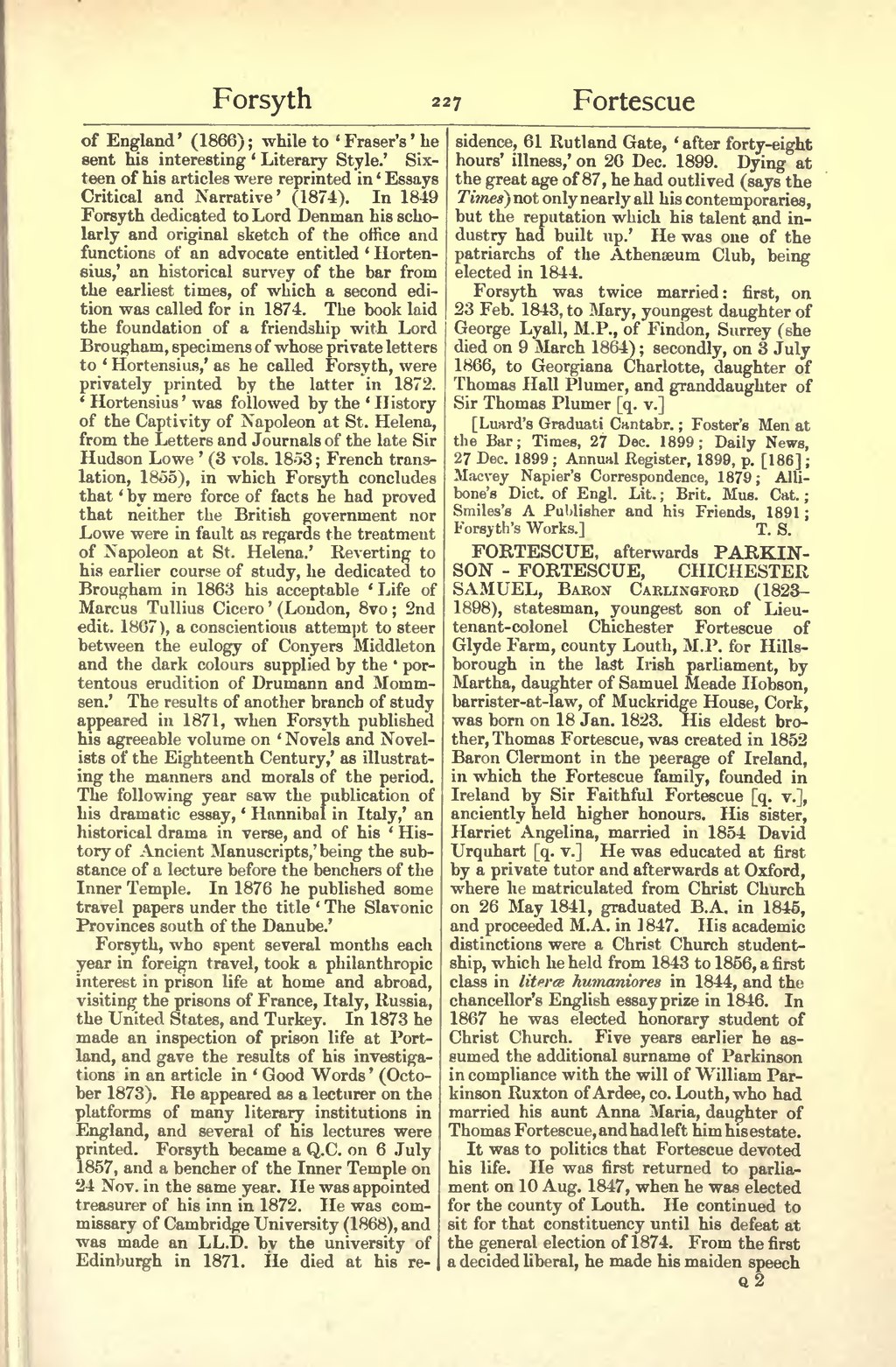of England' (1866); while to 'Fraser's' he sent his interesting 'Literary Style.' Sixteen of his articles were reprinted in 'Essays Critical and Narrative' (1874). In 1849 Forsyth dedicated to Lord Denman his scholarly and original sketch of the office and functions of an advocate entitled 'Hortensius,' an historical survey of the bar from the earliest times, of which a second edition was called for in 1874. The book laid the foundation of a friendship with Lord Brougham, specimens of whose private letters to 'Hortensius,' as he called Forsyth, were privately printed by the latter in 1872. 'Hortensius' was followed by the 'History of the Captivity of Napoleon at St. Helena, from the Letters and Journals of the late Sir Hudson Lowe' (3 vols. 1853; French translation, 1855), in which Forsyth concludes that 'by mere force of facts he had proved that neither the British government nor Lowe were in fault as regards the treatment of Napoleon at St. Helena.' Reverting to his earlier course of study, he dedicated to Brougham in 1863 his acceptable 'Life of Marcus Tullius Cicero' (London, 8vo; 2nd edit. 1807), a conscientious attempt to steer between the eulogy of Conyers Middleton and the dark colours supplied by the 'portentous erudition of Drumann and Mommsen.' The results of another branch of study appeared in 1871, when Forsyth published his agreeable volume on 'Novels and Novelists of the Eighteenth Century,' as illustrating the manners and morals of the period. The following year saw the publication of his dramatic essay, 'Hannibal in Italy,' an historical drama in verse, and of his 'History of Ancient Manuscripts,' being the substance of a lecture before the benchers of the Inner Temple. In 1876 he published some travel papers under the title 'The Slavonic Provinces south of the Danube.'
Forsyth, who spent several months each year in foreign travel, took a philanthropic interest in prison life at home and abroad, visiting the prisons of France, Italy, Russia, the United States, and Turkey. In 1873 he made an inspection of prison life at Portland, and gave the results of his investigations in an article in 'Good Words' (October 1873). He appeared as a lecturer on the platforms of many literary institutions in England, and several of his lectures were printed. Forsyth became a Q.C. on 6 July 1857, and a bencher of the Inner Temple on 24 Nov. in the same year. He was appointed treasurer of his inn in 1872. He was commissary of Cambridge University (1868), and was made an LL.D. by the university of Edinburgh in 1871. He died at his residence, 61 Rutland Gate, 'after forty-eight hours' illness,' on 26 Dec. 1899. Dying at the great age of 87, he had outlived (says the Times) not only nearly all his contemporaries, but the reputation which his talent and industry had built up.' He was one of the patriarchs of the Athenæum Club, being elected in 1844.
Forsyth was twice married: first, on 23 Feb. 1843, to Mary, youngest daughter of George Lyall, M.P., of Findon, Surrey (she died on 9 March 1864); secondly, on 3 July 1866, to Georgiana Charlotte, daughter of Thomas Hall Plumer, and granddaughter of Sir Thomas Plumer [q. v.]
[Luard's Graduati Cantabr.; Foster's Men at the Bar; Times, 27 Dec. 1899; Daily News, 27 Dec. 1899; Annual Register, 1899, p. [186]; Macvey Napier's Correspondence, 1879; Allibone's Dict. of Engl. Lit.; Brit. Mus. Cat.; Smiles's A Publisher and his Friends, 1891; Forsyth's Works.]
FORTESCUE, afterwards PARKINSON-FORTESCUE, CHICHESTER SAMUEL, Baron Carlingford (1823–1898), statesman, youngest son of Lieutenant-colonel Chichester Fortescue of Glyde Farm, county Louth, M.P. for Hillsborough in the last Irish parliament, by Martha, daughter of Samuel Meade Hobson, barrister-at-law, of Muckridge House, Cork, was born on 18 Jan. 1823. His eldest brother, Thomas Fortescue, was created in 1852 Baron Clermont in the peerage of Ireland, in which the Fortescue family, founded in Ireland by Sir Faithful Fortescue [q. v.], anciently held higher honours. His sister, Harriet Angelina, married in 1854 David Urquhart [q. v.] He was educated at first by a private tutor and afterwards at Oxford, where he matriculated from Christ Church on 26 May 1841, graduated B.A. in 1845, and proceeded M.A. in 1847. His academic distinctions were a Christ Church studentship, which he held from 1843 to 1856, a first class in literee humaniores in 1844, and the chancellor's English essay prize in 1846. In 1867 he was elected honorary student of Christ Church. Five years earlier he assumed the additional surname of Parkinson in compliance with the will of William Parkinson Ruxton of Ardee, co. Louth, who had married his aunt Anna Maria, daughter of Thomas Fortescue, and had left him his estate.
It was to politics that Fortescue devoted his life. He was first returned to parliament on 10 Aug. 1847, when he was elected for the county of Louth. He continued to sit for that constituency until his defeat at the general election of 1874. From the first a decided liberal, he made his maiden speech
